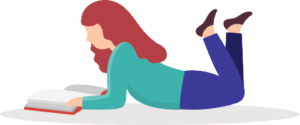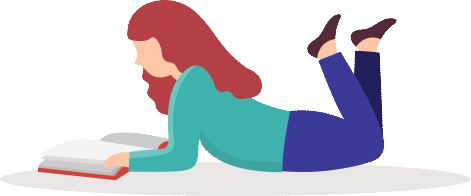How Can I Get My Child to Read for Pleasure?
Cheryl Gedzelman
Attention Magazine December 2019
Download PDF
 WHEN I WAS A CHILD, I always had my nose in a book. The characters became my friends, and I basked in their lives. Compelling plots urged me to pick up my book whenever possible—during short breaks in class and as soon as I returned home from school. Reading was my ultimate form of relaxation and still is. I continue to read endless fiction books, and I continue to get to know my characters and look forward to exciting turns in the plot. When I finish one book, I go right to the next. My parents did not push me to study or get good grades, but school work came easy to me.
WHEN I WAS A CHILD, I always had my nose in a book. The characters became my friends, and I basked in their lives. Compelling plots urged me to pick up my book whenever possible—during short breaks in class and as soon as I returned home from school. Reading was my ultimate form of relaxation and still is. I continue to read endless fiction books, and I continue to get to know my characters and look forward to exciting turns in the plot. When I finish one book, I go right to the next. My parents did not push me to study or get good grades, but school work came easy to me.
Now that I am an educator, I am convinced that reading for pleasure is the greatest predictor of outstanding reading fluency and school success. This is why so many elementary schools require daily reading and ask students to keep logs of their reading.
Just as in sports and music, practice leads to improvement. But in addition to improvement in fluency and comprehension, consistent reading leads to improvements in:
- abstract thinking
- quality of writing
- grammar
- vocabulary
- spelling
- test scores
- attention span
- success with all school work
- compassion and empathy
- stimulating imagination
- peace of mind
- understanding different walks of life and different personality types
- general and specific knowledge.
At the tutoring company I direct, we often receive calls from parents who need tutors for reading, writing and English. The first question I ask these parents is whether their child reads for pleasure, and the answer is frequently no. Many parents already know how important it is to read for pleasure and lament the fact that their children dislike reading or just prefer other activities.
How to raise a reader
Some parents complain that their child can’t or won’t sit down long enough to read a book. Some children have ADHD, or general attention issues, or just like to be moving. Here are some tips to help reluctant readers settle down with a book:
- Combine reading time with cuddle time and play time.
- Create a parent-child team in quest of high-interest books.
- Minimize distractions. Perhaps reading can occur out of sight of distracting toys.
- Schedule reading time to make sure it happens every day.
- Take breaks. Does your toddler listen to the book for three minutes and then run away? That’s okay; pick up the book again later.
- Talk about the books and ask casual questions, always trying to relate the book to your child’s life.
- Make predictions on what will happen next.
- Read favorite books over and over.
- For any unfinished book, use a bookmark, which will encourage your child to pick up the book later.
To help your children become independent readers, the best time to start reading to them is when they are babies. There are so many baby books with lovely pictures and tempting touchable pages. Touching the soft fur in animal board books will entice your children to love books. Don’t succumb to the I-Generation electronic festival. Give your toddler a book rather than an iPad.
While your children are young, continue to read to them every night. Add excitement with your voice and body language. Discuss the characters, settings, and plot, and talk about how the characters and story relate to your child’s life.
When your child is ready, usually in kindergarten, he or she will need to practice reading age-appropriate books. As a parent, you should certainly help your child sound out words and discuss the stories. However, do not stop reading aloud to your child. Learning to read is hard work, and to become a child who reads for pleasure, reading has to be interesting and relaxing. The stories you read to your child will be more interesting than the “I Can Read” books. The goal is to make reading not a chore, but a pleasure.
By second grade, your child should be beginning to read chapter books. Whether or not your child is reading fluently, continue to read aloud. A new chapter book reader works hard. He can have built in breaks if you take turns reading paragraphs or pages. By hearing your child read out loud, you can find out if he is sounding out words or guessing. By listening to you read out loud, he can feel the emotions of the passages. Don’t stop reading to your children until they are such fluent readers that they beg you to stop reading to them because it is faster for them to read silently.
Some children struggle with learning to read. It is important to be patient and stick to books at their level. If reading is a struggle, it is imperative to be in touch with teachers about seeking strategies and special help, including a possible evaluation. But remember that children develop at different rates and learn when they are ready. My husband and I were both taught to read before kindergarten. Consequently, I tried teaching each of my children to read at age four, but it didn’t work; neither was ready until kindergarten. According to the American Academy of Pediatrics,
Most children learn to read by 6 or 7 years of age. Some children learn at 4 or 5 years of age. Even if a child has a head start, she may not stay ahead once school starts. The other students most likely will catch up during the second or third grade.
Children with ADHD may have trouble with comprehension due to working memory deficits. However, this may not apply to high-interest material. Children who have trouble paying attention and focusing in some areas may be hyperfocused in areas that grab their interest, like the plot of a book that they picked out. If your child does have trouble with comprehension, taking the time to discuss the book and how it relates to your child’s life will pay off.
One comprehension technique that teachers and tutors use is to ask the child to create a movie in his head about a story. Ask him what the characters look like, and ask him to describe the scenery. Only when I started teaching did I discover that I always make movies in my head for any story, but lots of people don’t. However, this technique can easily be taught.

As young readers get older
Once your children are reading chapter books, encourage them to keep reading for pleasure.
- Take regular trips to the library and bookstore.
- Note which type of books and which authors your child likes, and seek out those books.
- Look for books that reflect your child’s interests.
- Look for a series—it is fun to track the same characters in book after book.
- Start a neighborhood book discussion group. (My daughter was in a neighborhood book group for three years in elementary school. The parents hired a teacher to direct discussions and activities.)
- Have a family reading time, when everyone reads.
- Discuss the books you are reading (yes, parents should be role models) and ask your children to tell you about their books. Encourage your children to visualize characters and events (making movies in their minds) and tell you about it.
- Listen to recorded books on family car rides.
- Let your children pick out their own books. Children will become better readers no matter what they read, even if it isn’t “high quality.”
- Introduce graphic novels. These are popular with today’s children, and many are part of a series.
Many children are avid readers in elementary school but stop reading for pleasure by middle school. This is usually because by middle school there are so many demands on their time that they feel like they no longer have time to read for pleasure. Many adults similarly tell me that they are just too busy to read for pleasure.
My answer is that none of us is too busy to read for pleasure, and this is why. In order to be human, we simply cannot work all of the time. People who attempt to do so burn out or have a breakdown. We need leisure time to be our best selves. This is how many people spend their leisure time:
- on their phones
- playing electronic games
- texting
- on social media
- watching television
- exercising
- playing
Exercise and play are pretty important, but most people can extract some time from the other activities to read a book or article for a half hour per day. But you won’t want to do so unless you value reading as a fun and rewarding activity rather than a chore. There are so many page-turners out there. Ask your friends, visit book stores, and search the internet for books that grab your interest. Then give them a chance to take you away into another world, and experience one of the most relaxing leisure activities of all.
Cheryl Gedzelman is the president of Tutoring For Success, a company that has helped thousands of students with home-based tutoring, academic coaching, and test prep in Washington, DC, Northern Virginia, and suburban Maryland since 1994. (Learn more at www.TutoringForSuccess.com.) Gedzelman serves on the boards of CHADD of Northern Virginia and Washington, DC, and the ADHD Resource Group of Northern Virginia.
Editor’s Note:
As you try these strategies, remember that even with a great deal of effort, we can't always bring about the outcomes that we wish for. The goal here is to offer parents tips for helping their child with ADHD become a reader, not to induce guilt. The more you follow these guidelines, the more you increase the likelihood that your child will become an avid reader. However, don't despair if your child doesn't respond; not all individuals find reading a pleasure.
Other Articles in this Edition
CHADD Hosts Summit to Address Impact of ADHD on Public Health
What’s a Comprehensive Assessment and How Could It Help My Child?
ADHD and Dental Care: Guidance for Parents and Caregivers
How Can I Get My Child to Read for Pleasure?
Mindfulness, ADHD, and Managing Emotions
Three Things I Know to Be True About ADHD in Adults
Support Your Future Thinking Skills
